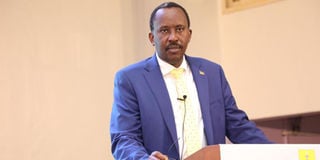Musinguzi Rujoki reappointed as URA Commissioner General

Mr John Musinguzi Rujoki, the commissioner general at URA.
What you need to know:
- Musinguzi's reappointment comes at the same time that the country's expectations for tax revenue are falling as it struggles to close a gap left by certain multinationals, denying it financial aid and concessional lending like the World Bank due to human rights violations.
Uganda’s national treasury has reappointed John Musinguzi Rujoki as Commissioner General of the Uganda Revenue Authority (URA), on the recommendation of the organisation's board.
URA confirmed the reappointment in a statement issued Friday, noting that the President, the national treasury, and the Central Bank have all shown their unwavering trust and support for the reassignment of the commissioner general.
“This collective endorsement underscores a unified commitment to our nation's fiscal integrity and prosperity,” URA notes.
Mr Musinguzi, who has been the commissioner general since 2020, holds a Bachelor of Science in Mathematics from Makerere University and a Master's degree in Computing and Information Systems from the University of Greenwich.
Musinguzi's reappointment comes at the same time that the country's expectations for tax revenue are falling as it struggles to close a gap left by certain multinationals, denying it financial aid and concessional lending like the World Bank due to human rights violations.
In 2024/25 financial year, for example, the budget is anticipated that domestic revenue collections will decrease by almost Shs3.5 trillion, from Shs25.2 trillion in the 2023/24 fiscal year.
In December, the Permanent Secretary and Secretary to the Treasury, Mr Ramathan Ggoobi, highlighted a Shs600 billion deficit in revenue collections during the first four months of the 2023/2024 financial year, from July to October.
Mr Ggoobi made reference to the possibility that the shortfall would result into significant budget and financing shortfalls for the entire government as well as for the provision of services to the people.
“From our modelling, the shortfall is projected to reach Shs1 trillion by the end of this financial year unless comprehensive measures are taken to close this gap,” the PS wrote.
The national treasury is concerned about tax evaders operating informally, commercial banks' practices of transferring and permitting expenses incurred on treasury bills to account for the general operating side, and tax leaks in deductions as well as expenses claimed by multinational corporations.
The nation has also already approved a Shs3.5 trillion supplemental budget, which has forced the Central Bank to explore ways to borrow Shs2.1 trillion to fund budget expenditures.




